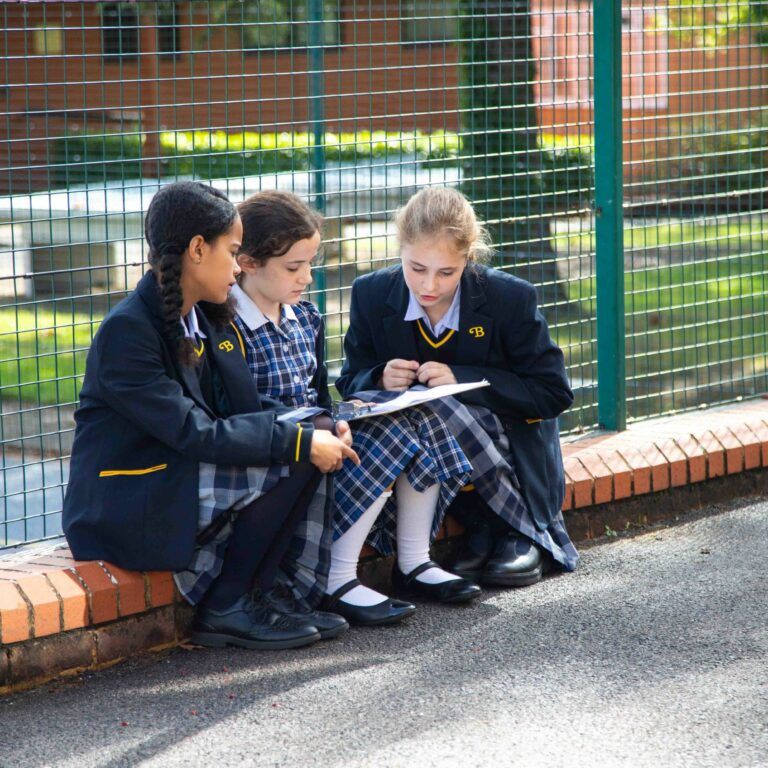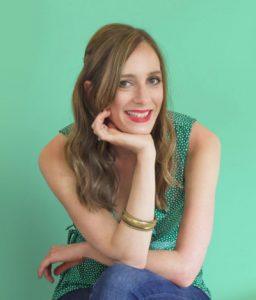Just in time for the summer holidays, it’s BookSmart Episode 5 with an exclusive interview with Holly Bourne.
Holly Bourne is a British author of young adult fiction. She is the author of best-selling novel Am I Normal Yet? and several other critically acclaimed books. She also writes online on feminist issues and writes for The Mix, a charity-run advice website for under-25s. Louise and Madison were thrilled to have the chance to interview Holly and their chat was wide-ranging, covering what inspires Holly, her favourite music and snacks and the challenges facing young women in today’s world.
Make sure you leave a comment on the video using #BookSmart so you can be in with a chance to win a signed copy of one of Holly’s books. Below is the video and then a transcript of the interview, followed by a selection of Holly’s books and some books our girls recommend.
Amelie/Madison: Hello! Hi, I’m Madison and I’m Amelie and welcome back to yet another episode of BookSmart.
Amelie: In this episode we’ll be interviewing Holly Bourne.
Madison: She has won many prestigious awards for her books.
Amelie: Her books also include themes of mental health and feminism, which I think is really wonderful.
Madison: And remember if you want a chance to win one of her books, please leave a comment in the video.
Amelie: Let’s roll the interview!
Holly: Hi, how are you?
Madison: Good thank you, how are you?
Holly: Good! I’m really happy to be here today, thanks for having me.
Louise: Thanks for joining us…
Madison: We have a few questions for you.
Louise: The first one is about one of the main topics you talk about in your books, mental health. Why do you believe it is so important to raise mental health awareness in your books?
Holly: So I never explicitly tried to write about mental health problems, but they are in all my books because I feel like… it’s a very normal thing unfortunately for lots of teen agers to go through and the way that I understand mental health problems, is, they are usually a reaction to a world that, you know, is not as healthy as it could be. And because all my books try and focus on trying to make the world a better place and trying to get teenagers to understand their problems in the wider context of the world that they live in, rather than thinking that there is something wrong with them. That kind of means that mental health is always there and sadly we don’t live in the healthiest happiest society that we could and I think that one of the biggest things books can do is educate and inspire them and I hope my books do help educate young people about… why they are suffering and what might be causing their suffering and maybe giving a name to their suffering or if it’s not them maybe it’s something their friend is going through or a family member and then hopefully with that education and knowledge, then inspiring them to kind of fight for a world that leaves less marks on people and means that our brains aren’t constantly struggling to make sense of these kind of difficult power structures that we live in or inequality or people behaving really badly towards us even though we’re trying really hard to be nice. And yeah so it would just be really strange to not write about mental health problems because I think we all struggle and I think you particularly struggle when you are teenager when puberty goes *bang* and then you’ve got forced education which is a terrible combination! Your starting to wake up to the fact that adults don’t really know what they are doing in a world that isn’t very fair and it’s just like this perfect storm for our brains to be like ‘I can’t cope with this!’ and get really sad or really anxious or both at the same time. I just tried to tell the truth about these experiences and sadly this experience when it comes to mental health can be really challenging.
Louise: definitely, yes!
Madison: I think it’s like, I think it’s so important that you write about things like this and it’s important that all authors bring awareness to it because it helps people who read the book understand what perhaps they might go through in the future or what their friend might go though so you can support them without being patronising, I guess.
Louise: And all your characters are all relatable…
Madison: They really are!
Louise: It’s like oh my gosh, this person is going through that as well…
Madison: And I think, I read this thing that, cause teenagers have synaptic pruning or something and when you take your GCSEs in England that’s when it’s happening, when your brain is literally preparing you for getting better, its literally when you have to take the most important, well… not the most important but really important exams that will shape your future, which seems a bit, um… skewwhiff!
Louise: Yeah!
Madison: So, how have your own life experiences affected your writing?
Holly: Umm… I feel like any writer whatever they write, of course your life is going to impact the stories you tell because it’s you writing them as it were. But at this point I’ve written ten books for teenagers and two books for adults and I think if I had lived everything that had happened to all my characters, it think I would probably err… yeah not be able to get out of bed in the morning. So there’s definitely, not every book I have written has bene purely autobiographical, what’s really great about being a writer and anyone who is watching this who wants to be a writer or wants to be creative in any way is you don’t have to completely put your whole self into a book. Living your life and having experiences and having thoughts or getting angry, those can always fire something that’s happened in my life specifically that then kind of started umm the idea for a book. So, for example, in my spinster club series, books about feminism especially in particular ‘What’s a girl got to do?’, the opening line is ‘I wasn’t even wearing a short skirt’. And it’s about this girl called Lottie, who gets really badly sexually harassed while walking to college which sadly I hear from young girls all the time. The times that you get harassed, even when in school uniform and you know and I found that really scary and that gave me the idea for that opening scene and then that character came. Or my most recent book which is called ‘The Year Book’ which is about a girl called Paige who decides to start telling the truth about how horrible people are at school and that kind of came into my life because at my school when I was younger and there was a group of bullies who that before it went to press, they changed the year book and put some really horrible things in there about people. And I think anti-bullying policy was very bad in the 90s or the early noughties because nothing ever really happened. And I remember that has always really bothered me, that no one was really held accountable. So… 15 years later I was like, right! I’m going to hold them accountable through fiction. So , there’s always little nuggets of my life or things that I can remember that makes you kind of realise that is gnawing at me a little bit and that is usually the beginning of a creative idea. As I said, anyone who wants to write stories or poems, just realise when you can’t get over something… when you’re really just like, I should just get on with my life and it’s that big a deal that you can’t, that’s usually where a story is, cause there is something to explore there. So none of my books are complete autobiographies but a lot of little bits and pieces from my life kind of start them.
Louise: Cool! We were just wondering, talking about your series of books ‘The Spinster Club’. Lottie, Amber and Evie they always have some sort of cheesy snack on the go. What would be your favourite snack for brain power when you are writing or something?
Holly: This is one of the things I get asked a lot and I’m not really a huge fan of cheesy snacks. Again it shows that my characters are not me… umm I remember we all once dared my friend Rachel to eat 20 bags of Wotsits when we were 15 and I’m just traumatised whenever I see Wotsits and I just remember the vomit that came out from my friend! *laughing* Sorry that’s really bad! I’m more of a chocolate person than a cheese person and you know when people start to give you cheese rather than chocolate cake at parties and stuff I’m like no this is unacceptable! What I hoped those books really liberated is that I do remember the joy of when girls all get together at a sleepover or after school and how snacks are a really important part of that and me and my friends were really into dip. So we would just buy loads of different tubs of dip and there was different things and we would have this glorious feast of really bad for you food and were groaning at each other lying on the sofa. I feel like we don’t see girls eat enough in books and in film. Whereas food is a real source of joy and coming together-ness when you are a teenager. So I really wanted to get food into that book.
Madison: What is your favourite word of phrase to put in a book? And do you think that is character specific so do you have a character that would like use slang? Do you have a phrase that they would use a lot in your writing?
Holly: I’m very wary of using slang, just because I get older every year umm and I’ve been doing this job for almost ten years now and whereas there are lots of people that carry on reading my books when they’re not teenagers any more but I have new teenagers finding my books as they sort of grow up and so I’m always very wary of using slang just because I don’t want to be that old person trying to understand… you know Tik Tok is your thing, you can just go and do it but I’m not going to try and be a grandma dancing… So I’m always wary of slang. I don’t have a motto but my favourite is a bit of a weird one but a word that I love just because it makes me laugh so much is the word… loins. And I do actually try and get that word into most of my books, just as a little joke for myself, so if you ever read any of my books look for the word loins because it is just purely funny. I remember when I was a university student about to get served this horrible dinner every night and every Thursday it was loin of Cod and just the thought that a Cod had a loin always made me laugh so hard I couldn’t order my food.
Louise: Ahh, that’s so funny!
Louise: Okay, so next question. It’s kind of a whacky one… if you were stuck on a desert island and you could take five items with you, what would you take?
Holly: oh dear… umm five, I am trying to think. The thought of being on a desert island alone, because I’m a very chatty person, makes me feel just so awful, so I think I’ll bring five things which mean I don’t have to stay on the island. Like a boat!
Madison: I will bring a plane so that I can leave!
Holly: But if that wasn’t an option, I would love to bring my entire book collection if that counts as one because I have this problem where, I’m sure anyone who loves reading gets it, there’s so many books that I have in my house that I want to read and then I always buy myself new books before I’ve finished the pile… so it would be really good to just catch up and then when I’m rescued, finally I don’t have this pile of books haunting me. I would really like some Quorn cocktail sausages as they’re my favourite.
Louise: I love them!
Madison: They’re so good!
Holly: You can never just have one, it always the whole pack. Umm I would have my cat who is my favourite thing, she was asleep… oh no she’s gone! Err what else… probably some sun tan lotion as I burn very easily and a whistle to call for help.
Madison: That’s a good idea. But that’s so true with books, I always have like these five books somewhere that I need to get to but there’s just too many books and I don’t know where to put them all cause I need to read them.
Madison: So this is kind of a weird one as well… if you had to pick a top two songs or top two genres which ones would they be for music?
Holly: Top two songs… so I really like story telling music so songs where I feel like the song writer is really telling a story. Obviously I really like songs that are fun to dance too and that sort of stuff but to me… usually country type musicians who are now mainstream, usually are the best story tellers. So I’m a real Taylor Swift fan.
Madison & Louise: Yes!
Holly: Just because I think if she was a man she would get a lot more respect for her level of skill. Cause her story telling in her songs is just second to none umm I have a friend who is an English teacher who teaches Taylor Swift songs in her lessons to be like look, this is good. She has written a song called ‘All too well’ which is a very famous song of hers, which I love just because if you look at the narrative structure and how she changes from first person to second person… this is where I geek out! And also I’m a really big fan of this guy called Bruce Springsteen, who I promise if you get into will change your life. People call it falling in the ‘Bruce Hole’ when you discover his music… you don’t listen to anything else for six months! He’s got a really good song called ‘Dancing in the Dark’ which I think if you’re a teenager you would love that song. I know older people are always trying to get you to listen to older music, he was old when I was young. Dancing in the dark is this incredible song that highlights that feeling of being bored, stuck in the mud of your life and you just want to escape of run away and you just need this spark to get out of yourself. I just think it’s an incredible song. So yeah, those two.
Louise: Yeah, I certainly relate in terms of, looking into lyrics. My parents are always like; you over analyse everything. But a lot of songs have a deeper meaning, which is quite nice to get into.
Madison: I like the songs that sound, like the melody is really happy, and then when you read the lyrics you’re like, oh my god! It’s amazing and I love it!
Louise: Yeah it’s so good. The next question is touching on another theme of your books which is feminism, which we have recently actually been studying in English. So what are your top tips as a feminist for pointing out sexism in the world?
Holly: Erm what are my top tips for pointing out sexism… Number one tip is accept the fact that people aren’t going to like you doing it and that is part of the work. Yeah, so it’s about, the way I always see it is probably very simple but it’s just like, would this be happening to boys? A lot of bad things to happen to boys that are different but a lot of the time it happens disproportionately. So sometimes they think it’s not something they need to worry about… they don’t feel safe walking home. I think that is a good way to scan through information and people aren’t going to like you pointing it out and one thing that I think is really important with feminism is there is only so much you can achieve by just yelling at people who don’t agree with you on the internet and actually there’s so much work that can be done if you want to be a feminist. It’s about fundraising for women’s issues that really need you and complaining to your local MP. My local MP hates me, I am literally always sending email going ‘what about this…’ and they have to reply to your email, they have too. So it’s lobbying, doing charity work, so I’ve done lots of work for Women’s Aid about abusive relationships and that I think actually helps you feel like you are doing something more, than when you are trying to get somebody to care that doesn’t want to care and is saying horrible stuff, either to your face or online. Calling out is really important but sometimes with feminism, it’s about doing the stuff and getting to know women and girls who have different lives to you and problems that you haven’t considered, I think that is really beneficial. And just look out for each other especially if you’re a feminist and you see each other as the enemy, we have so much internalised misogyny and we really just need to support each other and uplift each other and that doesn’t mean we have to agree with everything that the other person says. You are allowed to not completely agree and discuss and debate and that’s actually where change happens. I’ve had my mind changed loads by just having conversations with feminists who are friends politely and kindly and hopefully I’ve convinced them. You can only have that if you’re not screaming at each other and saying, ‘you’re doing it wrong!’. Lots of people say ‘we hate men’, so you already get enough from the people who aren’t a feminist at all and think that feminism is this undercover mission to chain all men to the walls. Don’t argue with the sisterhood, try and learn from each other.
Madison: There’s a lot of stuff that says ‘can you be a feminist and do this…’ but it’s important too, contradictions in people are really important and having different opinions is part of what’s important to feminism. You should be allowed to have different opinions to each other but you are all trying to reach a goal of equality with all sexes I think. So just because you might disagree with the beliefs of someone else who’s also fighting for equality or whatever, it doesn’t mean you have to shout at them to make them believe what you believe.
Holly: Yeah, and I always say criticise the power structure, not the person trapped in the power structure. You could even say with makeup, lots of feminists disagree about whether or not it is empowering or disempowering, rather than screaming at somebody for wearing makeup, look at the power structures, look at impossible beauty standards, look at the cosmetic industry, look at how they advertise things, look at photo shopped images on Instagram and the fact that lots of people use filters all the time when they don’t legally have to declare it. Those are the things to go for rather than your mate who is wearing foundation because she feels like she can’t show her spots because society has made her feel that those are disgusting. Criticise the society not the person and dismantle that and then maybe this friend might feel really empowered because of this thing.
Madeline: If it helps someone’s self-esteem to be wearing that layer of foundation I don’t think they should be criticised for it but then it’s what you said.
Holly: We are all doing the best we can, the analogy that I use a lot of the time is patriarchy, it is worth saying that boys are victims of patriarchy too. I use the analogy of the pickle jar, we are all pickles floating in this big jar of brine and the brine is the patriarchy and feminism is about realising that we are all trapped in this jar and so it’s about waking up to realise we are all in this jar and we need to try and get all the other pickles to throw themselves against that jar and topple it and smash it and be free but in the time that you are doing that you are still absorbing that juice. We are all slowly being pickled. We are going to be insecure about the way we look and we are maybe going to want a really big white wedding because we’ve got the juice. None of us can be this perfect feminist or this perfect ally because we are all trapped in the jar and until we have smashed it. That’s a really weird analogy but it works for me!
Louise & Madison: That’s a really good one!
Louise: Last question… again about feminism, what do you believe is the next step or steps to achieving equality between men and women?
Holly: It’s really interesting to see what’s coming out in the last couple of years, is violence against women and girls. I work with Women’s Aid and the book ‘The Places I Cried in Public’ is all about the normalisation of abuse in teenage relationships and I see that as the most pressing and urgent thing to tackle because not feeling safe and being traumatised on a level in which girls and women are traumatised, I think clips your wings in so many ways that is almost impossible to reach the true power of you. You’re scared or you’re not safe and all these things are happening so I feel like as there is more and more research coming out it is just starting to underpin what feminists have been trying to say for ages which is the sheer scale of violence against women and how normal it is to not be held accountable. I think it’s going to be really interesting to see how school students, girls and boys, talking about sexual harassment in schools, I know that’s been in the news a lot and this, where everyone is invited story, and we’ve had the Sarah Everard vigils and the huge public outpouring and I really hope that we are in a time where violence against girls and women is taken really seriously and looking at how to stop it and how to stop normalising it because what could we achieve if weren’t terrified all the time. You know, you leave your house and you walk down the street and it’s not up to you whether someone yells something gross at you or your trying to learn in a lesson… I remember at my school someone pinging my bra strap. It’s just a silly thing but I’m trying to learn and they are never held accountable and it’s disgusting. But that to me is the most important thing and also acknowledging that boys are victims of male violence too.
Louise: Definitely
Holly: Attacking male violence and how it’s harming all of us, I think would help, education, would help mental health, it would probably help the environment, it would help women going into work and how well they do. If you solve violence I think you would solve those things.
Madison: There’s definitely stuff that’s… ‘That happened to you but its normal, that happens to everyone’ deal with it kind of thing. That needs to go I guess.
Holly: Well it was also really normal not very many hundreds of years ago for a king to chop his wives heads of and that was normal! Things change… imagine if Prince William now was like ‘you know what Kate, I’ve found this 15-year-old I want to marry, I’m going to lock you in a tower, and everyone is going to watch on television while you are publicly beheaded. What is going on?! Just because things used to be normal doesn’t mean that they are okay.
Louise: Definitely, it’s horrible it’s this attitude that when a women gets raped in a room of four men. Everyone says ‘rape is awful, but what was she doing in a room with four men?’ Rather than, why the hell did they do that?!
Madison: I feel like if a girl wears a skirt out and gets harassed, they say she was asking for it because she was wearing a skirt and it just doesn’t feel right. You should be able to control yourself… if that makes sense.
Holly: The way that we see violence against girls doesn’t actually paint boys in a very good light, they should be just as upset. They are now saying that four year old girls should wear shorts so that their modesty is protected when they do cartwheels in the playground and who is looking at a four year old girl?! This is just a child playing. Give people more credit than that, do you really think boys and men are just these foul perverts who can’t help themselves… it demeaning and bad! It makes me so happy to be having this conversation with you, yes young people are great and they’re gonna fight!! I hope that my writing has helped inspire some of you.
Madison: I love your writing, it’s absolutely awesome!
Louise: I just got The Yearbook in the post
Madison: Me too actually
Louise: Really looking forward to reading it… thank you for having us.
Madison: It’s been awesome, thank you
Holly: Thank you so much, just keep reading and good luck with all this COVID life that you have!
BUY HOLLY’S BOOKS HERE:
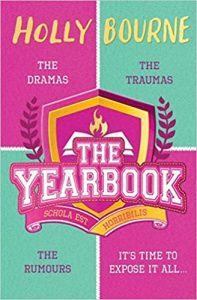
Buy from Amazon
Paperback: £6.55
Kindle Edition: £3.99
Audiobook: FREE with Amazon Audible
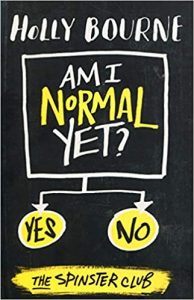
Buy from Amazon
Paperback: £6.55
Kindle Edition: £2.99
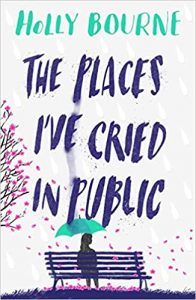
Buy from Amazon
Paperback: £6.51
Kindle Edition: £2.99
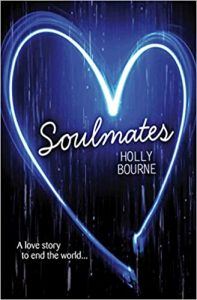
Buy from Amazon
Paperback: £6.55
Kindle Edition: £2.62
OUR BOOK RECOMMENDATIONS:
Amelie: So Madison, what was it like interviewing Holly Bourne, I know you are a huge fan of hers.
Madison: It was lovely to talk with Holly Bourne because I read a lot of her books and it is very interesting to find the insights behind all the words she’s written and the inspiration behind them, yeah it was just a wonderful opportunity.
Amelie: I’m glad. Shall we see the book recommendations from our friends.
Madison: Awesome.
Caitlinn: Hello. I would like to recommend to you one of my favourite books called I Am Not A Number by Lisa Heathfield. The book is a piece of historical fiction and follows the story of a young girl named Ruby when she goes to a concentration camp. I would recommend this book for anyone looking for a thought provoking read as I really enjoyed it. Thank you.
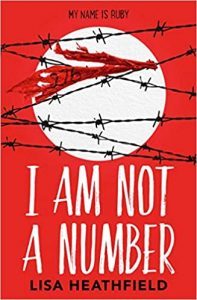
Buy from Amazon
Paperback: £2.79
Kindle Edition: £4.49
Melissa: Hello. My name is Melissa. I would like to recommend The Darkest Minds by Alexandra Bracken. The story follows Ruby who lives in a dystopian world where a mysterious disease has killed most of America’s children. The children who survive are left with frightening abilities they can’t control. I would really recommend this book because it is a thriller and it is very gripping.
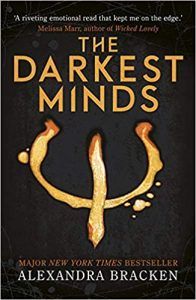
Buy from Amazon
Paperback: £6.55
Kindle Edition: £4.49
Amelie: For this month’s BookSmart I would like to recommend you guys Throne of Glass. It’s a gripping fantasy novel that I think you would all enjoy.
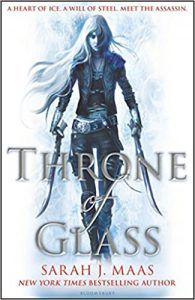
Buy from Amazon
Paperback: £7.37
Kindle Edition: £4.54


